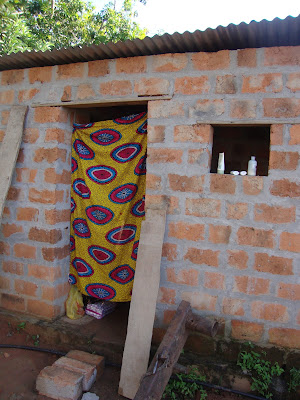Having
now lived in Zambia for over a year and a half, I notice that I have picked up some of
the cultural habits and expressions. In fact, I sometimes notice myself
slipping into a Zambian accent when speaking English! Although I teach in
English, it’s sometimes easier to use broken English to communicate with children
at school here or with Zambians who don’t speak much English.
 |
| Lecturing at Kaniki Bible University College - most probably with a Zambian accent! |
I
like the way that Zambian people say "Sorry, sorry!" if they see
someone hurt themselves. They don’t do this to admit responsibility for doing
something wrong, but rather to say they are sorry on behalf of that person. When
I first moved here I used to automatically tell the children at school not to
worry because whatever happened wasn't their fault, but now I find myself
automatically saying “sorry, sorry” instead.
 |
| With some of the pupils from Kapumpe |
I
have also learned to talk about where I stay
rather than where I live. We have
taught the children at school to ask and answer the question, "Where do
you live?", but in general conversation here, people recognise “Where do you
stay?” much more easily. Similarly, I used to find it irritating that the
children at school would say their head was “paining” rather than saying their
head hurt or they had a headache. Last year I tried to teach them to change how
they described having a headache but I think it’s a habit that’s hard to break.
As they say, “If you can’t beat them,
join them”… so I have embraced the “paining”.
“Beating”
is another word that is both overused and used incorrectly here, according to
our British understanding. If a child gets punched, kicked or even just tapped
on the arm, they will say that they have been beaten. As some of the children
at school do get beaten at home, we want to make sure they understand the
difference between this and something more insignificant.
 |
| Children at playtime |
 |
Playtime at Kapumpe
Another
rather lovely Zambian tradition is the way they greet everyone they come across, whether they know them or not. Zambians always take
the time to ask how someone is, if they’re talking to them or even if they are
just walking past. It could be in the supermarket greeting the cashier at the
till, meeting a policeman at a roadblock or bumping into a familiar face. The
answer is always “Bweno”, which is just like saying “I’m fine”. Here it is only polite for me to greet everyone I meet so it takes me longer to walk anywhere than it would at home.
|
Aside
from the language, there are a number of other local customs that I have
adopted. My sister Rachel will probably disown me for admitting this, but I
have embraced the not-so-stylish Zambian trend of wearing socks with flip flops.
I wouldn’t consider doing this back at home but it turns out to be quite practical
when it's warm in the day and colder at night. I should just add that I would
only ever wear socks and flip flops like slippers, when inside during the
evenings in the cold season. I still ban my Dad from wearing socks and sandals
at home!
 |
| Sporting the Zambian socks and sandals look |
All
Zambian women seem to own several chitenge, which are pieces of bright
coloured fabric that have many different uses. Ladies use them to
protect their clothes whilst working, to cover their legs/knees when walking
around in rural areas, to sit on the ground outside, to carry a baby on
their back, as a towel...I even found it could be a makeshift shower curtain! They are very handy to have and I am building up a nice collection.
 |
Chitenge shower curtain
 |
| Hope Church Winchester Team embracing the Zambian chitenge |
|
Seemingly
every Zambian eats nshima (maize), which is the staple food here. Initially I
wasn’t too sure about the idea of eating it with my hands rather than using
cutlery, but it turns out that nshima tastes a lot better when you roll it in
your hand. It has been explained to me that it is deemed inappropriate to do
this with both hands, and that it should be done only with the right because
the left hand is used for going to the toilet!
 |
| Eating nshima |
There
are some traditional customs that I haven't embraced yet. I haven't worn a wig
or a weave in my hair, which is something that most Zambian ladies do. I haven’t
tried eating chicken feet and I haven’t mastered the ability to carry things on
my head. I think it might take me quite some time to be able to carry a 25kg
bag of food on my head like the very skilled local ladies do here.
 |
| Local woman showing off her skills |









No comments:
Post a Comment